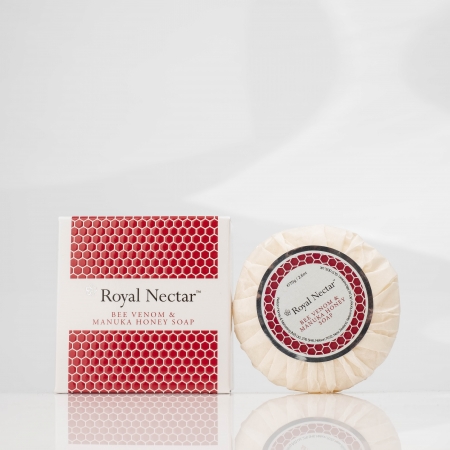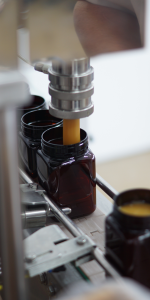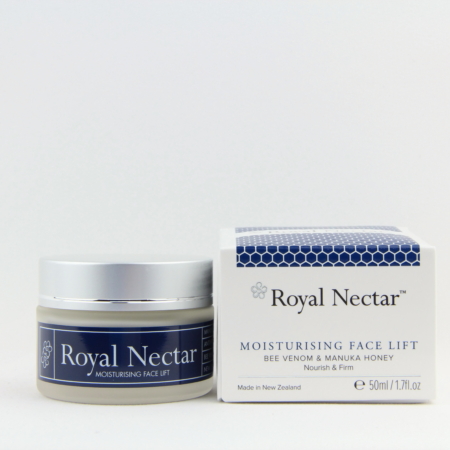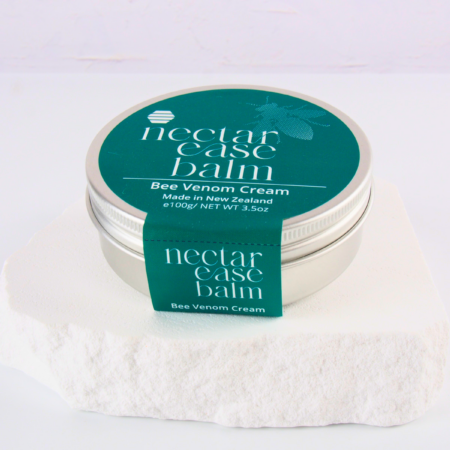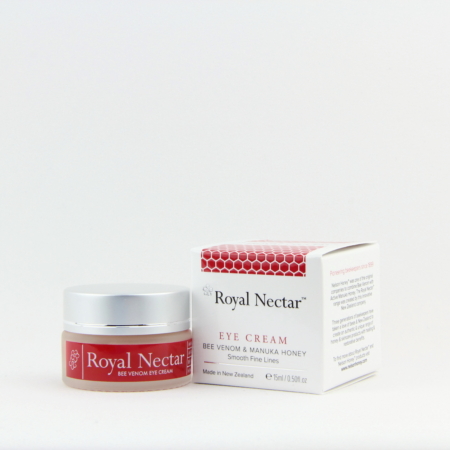Description
Royal Nectar Bee Venom and Manuka Honey Soap containing Nectar Ease™, a blend of Bee Venom & Active Manuka Honey. Bee Venom helps to restore and revitalise radiance and Manuka Honey is known to heal and protect the skin. A luxurious triple milled soap that gently cleanses and nourishes the skin. Triple milled providing superior quality and longer life.
Directions for use
Use daily in the shower or bath to gently cleanse and nourish. Also, perfect as a soothing hand soap.
Royal Nectar Bee Venom and Manuka Honey Soap is suitable for all skin types including those with sensitive skins.
Patch test before use.
Natural ingredients
Sodium Palmate, Sodium Palm Kernelate, Aqua, Leptospermum Scoparium Mel (Manuka Honey) (and) Bee Venom, Palm Kernel Acid, Sodium Chloride, Glycerin, Tetrasodium Etidronate.
EDTA free, good to the skin and environment.
Fragrance free making it ideal for sensitive skins.
Size: 75g
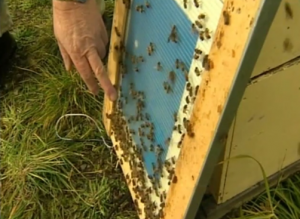
Introduction
The science behind Bee Venom is still developing and researchers continue to find new uses for it. We add small quantities of Bee Venom to Manuka Honey to create our hugely successful Nectar Ease product range and this also forms the basis for our Royal Nectar skincare range.
Bee venom composition
Bee Venom composition and strength varies between Honeybee species and small variances are identifiable between bee breeds and locations.
The natural components of Bee Venom have been isolated and studied scientifically and one of the most important components has been identified as Melittin. Making up about 50% of the Bee Venom.
Bee venom uses
Here at Nelson Honey we use Bee venom in two ways and have become famous for our innovation with this ingredient.
We started adding Bee Venom to honey over 3 decades ago after feedback from beekeepers was so positive. A range of Nectar Ease products was formed with our original Bee Venom and Manuka Honey, gaining a great reputation in New Zealand.
Nectar Ease honey was originally used as an ingredient of a facial treatment gaining worldwide media attention from which our Royal Nectar skincare range was born.
Today the Royal Nectar skincare range has a strong following and is particularly famous with Asian consumers.
Bee venom extraction
The Bee Venom used in Nectar Ease is extracted exclusively from the Apis Melifera species of Honeybee. Bee Venom is extracted from Honeybees using low voltage electrical stimulation. Beekeepers use a so-called collection frame that has wire electrodes installed that have a low electrical current running through them on a glass base, just like in the picture above. These frames are installed in honey hives and bees that come into contact with the wire electrodes will receive a small electrical shock. This causes bees to sting the glass, releasing the venom without losing their barbed sting (which usually results in bee deaths).
Once the collection process has finished, the Bee Venom dries on the glass, then the whole frame is transported to a laboratory to collect the venom.
No bees are harmed during the bee venom collection process.
Read More
Science of Honey
Honey has been used since ancient times for its special properties. Good quality honey can contain beneficial plant compounds including antioxidants. It contains high levels of glucose and fructose, a natural alternative to those wishing to avoid refined sugar. However, the composition of a honey batch depends on the floral source(s) available to the bees that produced the honey.
Nelson Honey operates a team of beekeepers and has hives located throughout the beautiful regions at top of the South Island of New Zealand. Hives enjoy spectacular and remote locations including Maori Bay in the Marlborough Sounds and Rainbow Station in St Arnaud.
Here at Nelson Honey we can trace our honey back to the hives they came from and our team of beekeepers maintain the health and happiness of all our bees.
Manuka Honey
There has been much research done on the components of manuka honey, leading to worldwide acclaim of this wonderful honey.
Manuka Honey is unique to New Zealand and its special benefits have been a traditional part of folklore throughout New Zealand’s settled history.
At Nelson Honey, we test all our Manuka Honey for MGO (Methylglyoxal) activity along with other chemical markers to ensure that it is authentic manuka honey. Methylglyoxal is expressed as a minimum number of mg/kg and scientific evidence has confirmed it as being a key compound that occurs naturally in Manuka honey.
Honeydew Honey
While Manuka Honey is extremely well-known for its special properties, our Honeydew Honey has some special characteristics. It contains complex sugars called Oligosaccharides.
|
Average Nutritional Value per 100 g
|
| Energy |
1,340 kJ (320 kcal) |
| Carbohydrates |
79.6 g |
| Fats |
0 g |
| Protein |
0.4 g |
| Water |
17.10 g |
| Riboflavin (vit. B2) |
0.038 mg |
| Niacin (vit. B3) |
0.121 mg |
| Pantothenic acid (B5) |
0.068 mg |
| Vitamin B6 |
0.024 mg |
| Folate (Vit. B9) |
2 μg |
| Vitamin C |
0.5 mg |
| Calcium |
6 mg |
| Iron |
0.42 mg |
| Magnesium |
2 mg |
| Phosphorus |
4 mg |
| Potassium |
52 mg |
| Sodium |
12 mg |
| Zinc |
0.22 mg |
Read More

